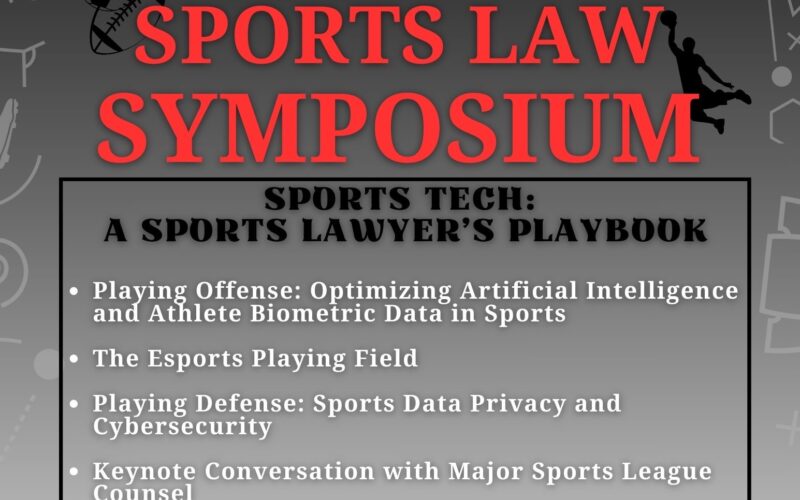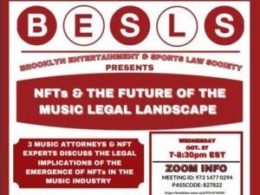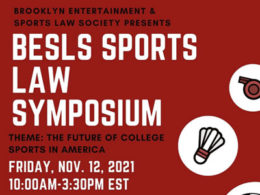On Friday, October 27th, the Brooklyn Entertainment and Sports Law Society (BESLS) and the Intellectual Property Law Society (IPLA) hosted the third annual Brooklyn Law School Sports Law Symposium. The symposium theme was “Sports Tech: A Lawyer’s Playbook” and had many students, faculty, practitioners, family, and friends in attendance. The event was a phenomenal success and BESLS and IPLA already cannot wait for the symposium next year!
The first panel of the day, “Playing Offense: Optimizing Artificial Intelligence & Athlete Biometric Data in Sports,” provided insightful conversations on the role of artificial intelligence (AI) in the sports industry. AI vastly impacts sport players on and off the field including athletes, coaches, leagues, streaming services, fans, and the media. The panel was moderated by Karleigh Wike (Associate at Ropes & Gray LLP) and was joined by Eric Fishman (Partner at Arentfox Schiff), David Foster (Deputy General Counsel at NBPA), and Meeka Bondy (Senior Counsel at Perkins Coie LLP).
The panel began with each panelist introducing AI value in sports such as gathering player statistics, refereeing, optimizing workouts, fan engagement, and much more. AI is creating more content by enhancing training and expanding the viewer experience.
Ms. Wike and Ms. Bondy then discussed how the role of AI in influencing intellectual property laws. Ms. Bondy explained that AI affects copyright issues, athlete rights, and right of publicity regulations. AI is used to convey player statistics, biometric data, video footage, and the use of an athlete’s name, image, and likeness. Player statistics, which are readily observable facts, cannot be copyrighted and therefore are not protectable. Biometrics, which are private facts such as heartbeat and sleep, cannot be copyrighted, but are protected under privacy laws. Video footage includes recordings of games for coaches to analyze and media usage for streaming and television, and the media has many restrictions on their use of footage. The use of an athlete’s name, image, and likeness is not covered by copyright law but instead covered by state right of publicity laws. However, this protection is often limited to commercial uses and uses that involve famous athletes.
Mr. Foster and Mr. Fishman then discussed their roles in protecting athlete data. Mr. Foster explained that biometric data is usually tracked by wearable devices and that leagues typically want to release data to the public to attract audience engagement to gain revenue. It is Mr. Foster’s job to inform players on what data is released and to prevent them from releasing too much data. Mr. Fishman emphasized the importance of educating athletes on the value of their data because it includes not only their biometrics but also personal identifiers. Ms. Bondy affirmed the importance of “future proofing” on behalf of clients in contracts because a contract is a playbook on what will happen to each respective party in the future.
The panel concluded with a discussion on AI’s influence on broadcasting and media rights. Mr. Foster explained that with the emergence of advanced technology, fans are commanding more information. AI has created the ability for increased entertainment for the viewer when watching games both at the stadium and at home. Ms. Bondy added that streaming services also want the freedom to make their own applications for fans that are unique to the stadium experience. The panelists provided sports betting as an example of connecting data and sports. AI can assist with score predictions such as potential injuries and the weather. Although sports betting has increased viewership, fan emotions are now heightened, which sometimes affects their treatment of athletes. Some fans might only be watching for betting purposes. Fans feel like they are immersed in the game, but they must be kept in check to preserve the integrity of the game and safety of athletes. All in all, the emergence of artificial intelligence in sports is rising quickly and will only increase. One possibility is that athlete personalities will be monetized, and it is more vital than ever to ensure athlete protection.
BESLS, IPLA, and everyone in attendance would like to thank the panelists and the moderator for an informative conversation about the intersection between AI, athlete biometrics data and sports.




